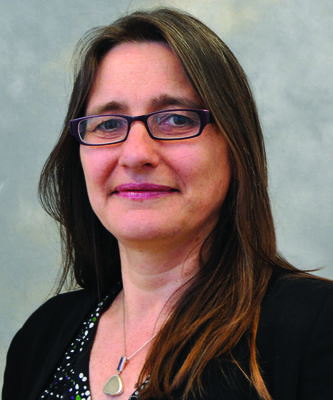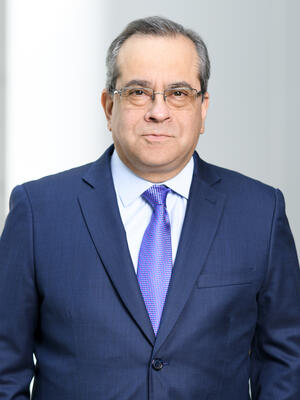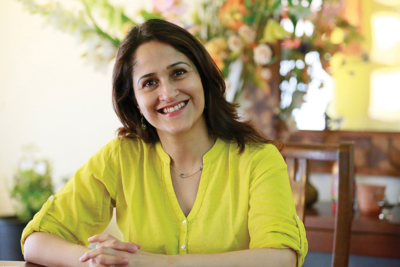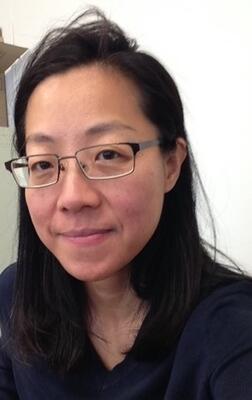Past Fellows
Roberta Bassett
|
|
Roberta Malee Bassett is Global Lead for Tertiary Education and Senior Education Specialist at the World Bank, providing technical expertise for projects related to tertiary education reform initiatives around the world. She has been team lead for a variety of tertiary education projects in the Africa and Europe/Central Asia regions, spanning topics such as finance and quality assurance reform, internationalization of higher education, equity and access, research and competitiveness, and skills development. She currently serves on the Editorial Board of Higher Education Quarterly and the International Advisory Board of the International Network for Higher Education in Africa (INHEA). Prior to joining the World Bank in 2009, Roberta served on the academic staff of the Centre for Higher Education Policy Management and Policy at the University of Southampton (UK); research fellow in the Center for International Higher Education at Boston College (2000-2005); and Managing Editor of The Review of Higher Education (2000-2004) and of Educational Policy (2004-2005). She also has extensive university administration experience, including serving as: Assistant Dean and Director of Summer Session at Stanford University (1995-2000) and Residence Director at Simmons College (2000-2004). She is the author/editor of numerous publications on topics related to higher education, including: The WTO and the University: Globalization, GATS, and American Higher Education (2006); International Organizations and Higher Education Policy: Thinking Globally, Acting Locally? (2009) and The Forefront of International Higher Education: A Festschrift in Honor of Philip G. Altbach (2014). Roberta holds a B.A. in Political Science from Columbia University; MA in Higher Education Administration from Stanford University; and PhD in (International) Higher Education from Boston College |
Cláudia Costin
|
Cláudia Costin's virtual visit will span parts of September and October 2021.
|
Cláudia Costin is the founder-director of CEIPE-Center for Excellence and Innovation in Education Policies, a think-and-do tank within Getulio Vargas Foundation, a leading private University in Brazil where she is a professor. She was recently the Senior Director for Global Education in the World Bank and a Visiting Professor of Practice in Education from 2016-2019 at the Harvard Graduate School of Education. Cláudia was Secretary of Education of Rio de Janeiro and Federal Minister for Public Administration and State Reform, Brazil. In 2018 she joined the Global Commission for the Future of Work at the International Labor Organization (ILO) and more recently, November 2020, she joined both Governing Boards from Unesco UIL – Institute for Lifelong Learning and Qatar Foundation. Course title: Education in the developing world and the response to the COVID crisis Her virtual class will be held:
This class will open for Registration with all other Fall classes. |
Dion Cunningham
|
Dion is visiting HGSE October 23-November 5, 2022. His course, Music as the Universal Language for Education and Learning in the Classroom and Beyond is open for enrollment, 8/26/22. |
An educator, researcher, artist, and interdisciplinary practitioner, Dion Cunningham (Doctor of Musical Arts) currently serves as an assistant professor at the University of the Bahamas (Nassau, Bahamas) in a dual appointment between the School of Education (Music Education) and School of Communication (Music Department). His research intersects artistic and scientific disciplines, and explores the following: critical analysis of historical instrumental pedagogy and technique; neuromechanics and motor control of piano playing; issues of piano technology, ergonomics and injury; development of instrumental proprioception; and knowledge gaps in aspiring and professional pianists. These research areas extend from his dissertation work entitled “The Science of Artistic Expression: Intersections of Piano Pedagogy and Human Neuromechanics.” Dion’s curiosities extend beyond the scientific realm into the world of education and entertainment. He is the founder and producer of Adventures in the Arts - a non-profit foundation centered around the concept of “edutainment.” Their interactive programing utilizes performing, visual, and multimedia art forms to explore concepts in non-arts disciplines as well as stories and issues of culture, industry, society, and human existence. In this work, Dion has researched and collaborated with artists from across North America and the Caribbean and institutions including the Dance Theater of Harlem (NYC, NY), the Collage Dance Collective (Memphis, TN) and Design Strong (Nassau, Bahamas). This edutainment outreach work has been presented to over 2000 people throughout the Bahamas and North America. As a concert pianist, Dion has performed throughout North and South America, the Caribbean and Europe. A prizewinner in the American Protege International and American Prize Solo Piano competitions, he made his Carnegie Hall debut in 2016 and is frequently sought after as a recitalist and a collaborator. He will make his solo piano album debut this Fall entitled “Dion presents Robert Schumann” where he explores the early works of Robert Schumann and their intersections with themes of play, passion, serenity and mental health. Dion has 15 years of experience in K-12 education systems within the Bahamas and the US. His teaching career pursuits have also given him the opportunity to partner with the Baltimore Symphony Orchestra OrchKids (Baltimore, MD) and the East Lake Expression Engine (Chattanooga, TN) in their social outreach education programs for the past 10 years. Additionally, he also serves in similar capacities in his local church, Christ Community Church (Nassau, Bahamas). Dion holds his terminal degree from the University of Maryland, College Park as well as a Master's of Music from the Peabody Institute of Johns Hopkins University. He also holds a Master's of Music Education (Vandercook College of Music), a Diploma in Education (College of the Bahamas) and Bachelor of Arts Degrees in Biology and Music (Macalester College). In his spare time, Dion enjoys outdoor recreational pursuits. He is also a certified scuba diver, amateur triathlete and a 2-time Ironman 70.3 finisher. |
Becky Francis
|
Professor Becky Francis is Director of the UCL-Institute of Education (IOE). Before this, she was Professor of Education and Social Justice at King’s College London. She has followed a research career focusing on education and social justice, incorporating education policy work, for example in her previous roles as Director of Education at the RSA, and as Standing Advisor to the Parliamentary Education Select Committee. She regularly serves as a consultant to Governments and international agencies on education policy matters. |
Her policy inputs and publications have focused on social mobility and educational quality, including expertise in academies policy, teacher development and careers, school quality and access, and in/equalities in educational attainment. Best known academically for her work on gender and achievement, Becky's academic expertise and extensive publications centre on social identities (gender, ‘race’ and social class) in educational contexts, social in/equality, and social identity and educational achievement, and gender theory. Becky was a member of the UK REF 2014 sub-panel for Education, and has acted as a judge for various practitioner awards panels, including the National Pupil Premium Awards and the TES Teacher of the Year awards. She is currently directing the Education Endowment Foundation-funded project ‘Best Practice in Grouping Students’, a mixed methods study involving 140 English secondary schools, investigating attainment and non-attainment grouping in relation to social inequality. |
|
Course was held in October 2018 Social Inequality and Schooling: a Policy Perspective Class number: A811a1 Schedule: T,W 7:00pm-9:00pm- light dinner provided; F 8:00am-12:00pm- coffee break provided; the dates for this class are Oct. 9th, 10th, and 12th. Description: Education is often presented as the method to deliver meritocracy and to facilitate social mobility. Yet the evidence suggests that education reproduces -- or even exacerbates -- existing social inequalities. Narrowing socio-economic gaps for educational attainment has become a policy directive for many OECD nations, including the UK. But are schools the key? Can policies that focus on education alone be productive in promoting equity, or does policy need to focus on other factors? Led by British education policy expert and leading sociologist Professor Becky Francis,Director of the University College of London (UCL) Institute of Education, this class will explore these issues. Drawing on the case of education policy in the UK and elsewhere, we shall analyse the ways in which international policymakers have approached these challenges, and evaluate impact from a social-justice perspective. This is the first in a series of one-credit classes taught by the 2018-2019 cohort of the Chen Yidan Visiting Global Fellows program. Students may personalize their experience by taking only one of the courses or by taking several and forming a series of credits in the area of global studies. For more information on the fellows, their classes, and upcoming events, please visit our website at globalfellows.gse.harvard.edu.
|
Other Ways to Connect with Becky: October 10th, 2018, 12:00-1:00pm- Student Networking Event- October 11th, 2018, 4:15-6:00pm- Co-sponsored Seminar talk by Becky Francis October 11th, 2018, 6:00-7:00pm- Reception following Seminar Talk
|
Otto Granados
|
Otto Granados Lecture Series:
|
Otto Granados- The former Mexican Secretary of Public Education, Otto Granados has taken office as the new President of the OEI Advisory Board for the period 2019-2022 after his appointment last July by the Secretary General of the Organization of Ibero-American States for Education, Science and Culture (OEI), Mariano Jabonero. Previously he was Under Secretary of Planning and Evaluation of the SEP itself; Ambassador of Mexico to Chile; General Director of the Institute of Public Administration of the Tecnológico de Monterrey; Governor of the state of Aguascalientes, Mexico; General Director of Social Communication and Spokesman of the Presidency of Mexico; Senior Officer of the Mexican Secretary of Programming and Budget; Counselor for Political Affairs of the Embassy of Mexico in Spain, and Head of the Office of the Secretary of Public Education. He is the author of several essays and books on public policies and educational management, and has received various distinctions, among which, Global Leader of the World Economic Forum; the Order of Civil Merit, in Degree of Grand Cross, granted by the Government of Spain; the National Council of La Raza Distinction for its contributions to the Hispanic population in the United States; the General Order Bernardo O'Higgins, granted by the Government of Chile, and the Grand Cross of Academic Merit of the Institute of Stock Market Studies of Spain.
|
Cliona Hannon
|
Spring 2022 course: Bending the Arc: Global Case Studies on Creating Socio-economic Diversity in Higher Ed Admissions April 18-27, 2022- see my.harvard for information on registration Student Networking Event (lunch provided) - Thursday, April 26th, 12-1pm, Longfellow Hall 207. RSVP here. |
Dr Cliona Hannon is currently the CEO of Katharine Howard Foundation which focuses on prevention and early intervention programs for young children and families from low income backgrounds. She is also the Founding Director of the George Moore Scholars programme, which provides high-value scholarships to exceptional students in Ireland who wish to undertake Master's degree study in the USA, Canada or the UK and who are likely to be game changers in their field of study. During her work as the Director of Trinity Access at Trinity College, Dublin, Cliona developed a range of innovative courses to diversify admissions into selective universities and to prepare teachers in working class communities to lead change in their classroom, school and communities. Cliona is an expert on the development, evidencing and scaling of educational outreach and alternative admissions routes, which are transforming admissions in Trinity College Dublin, the University of Oxford and the University of Cambridge in the UK. In 2016, after building a 20-year evidence base in diversified admissions to Trinity College Dublin, Cliona was appointed as a Visiting Fellow and Course Director in Lady Margaret Hall (LMH), the University of Oxford, to build a Foundation Year aimed at young adults from working class, refugee and care backgrounds who require additional academic preparation to gain admission to Oxford University. The LMH Foundation Year has had a 100% retention rate and progression rate to higher education, 80% of which has been to the University of Oxford. In May 2019, the University of Oxford announced that the Foundation Year would be scaled across the university, so that by 2023 one in four student (25%) admissions will be from working class backgrounds. In late 2018, the University of Cambridge launched a £500 million campaign to resource a foundation year for low income students, which was reported by The Financial Times to be based on the Trinity College Dublin and LMH models. Cliona is also director of the multi award-winning Trinity Access 21 project, a whole-school, action-inquiry project which focuses on developing strong ‘college-going cultures’ within working class communities and empowering teachers through a professional development postgraduate course to create active, engaged, democratized classrooms. |
David Johnson
|
David's class A811A6, Raising Learning Outcomes in Developing Countries: A Systems-Level Approach is now open for enrollment, my.harvard.edu See more information here! |
David Johnson - is a Chartered Psychologist and Professorial Fellow and Reader in Comparative and International Education in the University of Oxford. He is the director of the Centre for Comparative and International Education. David studies educational systems in the developing world and is particularly interested in countries affected by war and conflict. He has written widely on ethnicity, conflict and education in countries such as South Africa, Sierra Leone, and Sudan and on post-election violence on education in Kenya. He is the series editor of Policy Directions for Raising Learning Outcomes in Developing Countries (Bloomsbury) and was until recently the Programme Research Lead for the £20 million ESRC/DFD funded Raising Learning Outcomes in Education Systems in Developing Countries Research Programme that comprises of 30 research studies in 15 countries in Africa, South Asia, and Latin America. Currently he is one of 5 principal investigators in a £3million research study on Nigeria. The research is housed at Princeton University and falls under the auspices of the Research on Improving Systems of Education (RISE) Research Programme (Blavatnik School of Government, Oxford). He works closely with the World Bank on the design and implementation of National Learning Assessments in Sudan (2015 and 2018) and Nigeria (2019) and designed in 2010 indicators for the assessment of teacher effort and motivation, currently used in a comparative study of service delivery (Service Delivery Indicators, World Bank) across sub-Saharan Africa. David has recently been elected the Chen Yidan Viditing Global Fellow at the Harvard Graduate School of Education. |
LeAnna Marr
|
LeAnna is visiting February 27th to March 10th, 2023. She will teach,US Foreign Policy and Education: From Legislation, to Strategy, to Country Level Programming. Find out more about her course, here.
|
LeAnna Marr has more than 30 years of experience in education. She currently serves as Deputy Assistant Administrator at USAID and serves as Acting U.S. Senior Coordinator for International Basic Education Assistance. She worked as Association Peace Corps Director, an international education consultant, and as Executive Director of a non-profit adult education program before joining USAID as a foreign service officer in 2004. Her primary area of expertise is in Education in Crisis and Conflict settings, having worked in Guinea, Sudan, North Macedonia, and South Sudan and serving as senior education advisor on USAID’s Afghanistan/Pakistan Task Force. Ms. Marr represents the USG on the Board of Directors for the Global Partnership for Education and the Executive Committee of Education Cannot Wait. Ms. Marr has a Master’s in International Education Policy from Harvard’s Graduate School of Education and an undergraduate degree in French from Kalamazoo College. |
Alejandra Meneses
|
|
Alejandra Meneses is an Associate Professor at the Campus Villarrica of the Pontificia Universidad Católica de Chile and was also a professor at the Faculty of Education of the same university. Her research and teaching are at the convergence of the fields of linguistics, education, and science with a focus on language development and multimodality across school ages and their associations to literacy and science education. She has published on topics related to language for school literacy, text-based discussion, multimodal comprehension, and literacy in digital contexts in Spanish and English. She has collaboratively developed an intervention to promote learning in science through language and literacy to reverse educational inequalities (Project CLIC!). Alejandra also led the improvement process of the initial teacher education programs of the Faculty of Education at PUC, taking a leadership role in designing and implementing a practice-based teacher education model. In her teaching for the preparation of teachers, Alejandra has implemented innovative strategies for orchestrating digital tools for learning. In particular, she has implemented flipped classrooms for literacy methods. She has also co-created with colleagues a MOOC on Coursera on Practice-based teacher education for developing 21st-century skills. Alejandra is a member of Academia Chilena de la Lengua (Santiago) where she is a contributor to the discussion on inclusive language after the 2018 Chilean feminist protests. She has been interviewed on this topic in different media, such as El Mostrador, PAUTA and Revista Universitaria. Also, she has prepared a digital module about "How language changes" for Media UC. Alejandra headed a collaborative work with more than 90 authors –academics and schoolteachers– entitled Pedagogies of proximity: Learning in times of crisis (Didácticas para la proximidad: Aprendiendo en tiempos de crisis) for the Mesa Social COVID-19 to develop adaptive guidelines for teaching in times of crisis. The report proposed learning pathways in Arts, Mathematics, Science, History, Language, English as a Second Language, and Physical Education for different connectivity situations. Alejandra consistently collaborates on different educational policy forums in Chile and Latin America, as well as participated in teacher education workshops with various organizations and NGOs. She founded the interdisciplinary platform Factoría Ideas (https://factoriaideas.cl/), a community that brings together teachers and researchers focused on promoting social change through educational equity. Her work is based on trust in teachers as agents of social change, and she works so that each person can be recognized according to their dignity and be able to raise their voice. |
Alexander McLean
|
Alexander is visiting HGSE January 30th-February 10th, 2023. His course is Education is Liberation: The Transformative Potential of Education in Prisons. Find our more about his course, here.
|
Alexander is the Founder and CEO of Justice Defenders. He is passionate about justice, having trained as a barrister and magistrate. During gap year travels to East Africa, McLean fundraised to provide better health facilities and educate Ugandan incarcerated people about the law. After graduating from the University of Nottingham in 2007, he moved to Kampala, where he created a team of local and international staff and volunteers to develop the work of the African Prisons Project. |
Frosso Motti-Stefanidi
|
Spring 2022 course: Immigrant and Refugee Youth Resilient Adaptation: A European Perspective April 4-13, 2022- see my.harvard for registration information April 7th, 4:30-5:30pm Lecture: Immigrant Youth Resilient Adaptation: Who Adapts Well and Why? - Larsen Hall 203 RSVP here. April 7th, 12-1pm, Longfellow 228, Student Networking Lunch with Frosso Motti-Stefanidi- lunch provided! RSVP here |
Frosso Motti-Stefanidi is Professor of Psychology at the National and Kapodistrian University of Athens, Greece. She is an internationally recognized scholar of immigrant and refugee youth adaptation. Taking a strengths-based approach, she examines immigrant youth adaptation from a resilience perspective. In her work she addresses the question “Who among immigrant and refugee youth adapt well and why? She has developed the Athena Studies of Resilient Adaptation (AStRA) project, which includes two large longitudinal studies of over 2500 middle school students, focusing on the adaptation and well-being of immigrant youth, and of their Greek classmates, in the school context. One was conducted before and the other during the Great Greek Economic Crisis. She has presented the social policy implications of her work at different Working Groups of the European Parliament as well as at conferences organized by NGOs interested in the adaptation of migrant and refugee youth. She has also organized a number of summer schools and experts’ meetings on behalf of European and American scientific societies on the topic of immigrant youth adaptation, development and acculturation. Frosso received her PhD in 1986 from the Institute of Child Development of the University of Minnesota, USA. She has received the Distinguished International Alumni Award from the College of Education and Human Development of the University of Minnesota in 2005, she is a Fellow of the Association for Psychological Science (APS, 2010), and a Chen Yidan Visiting Global Fellow at the Graduate School of Education, Harvard University for the academic year 2019-2020. She has served as Chair of the Department of Psychology, University of Athens, Greece, as President of the European Association of Developmental Psychology (EADP), and as President of the European Association of Personality Psychology (EAPP). She is currently a Member of the Governing Council of the Society for Research in Child Development (SRCD) and a Member of the Secretariat of the International Consortium of Developmental Science Societies (ICDSS). She has served as Member of the Editorial Board of the European Journal of Developmental Psychology. She is currently a Member of the Editorial Board of the SRCD journal Child Development Perspectives. She has also served as Panel member for the evaluation of Consolidator Grant proposals at the European Research Council (ERC) in Brussels, and as Chair of Panels for Economics and Social Sciences of the European Science Foundation (ESF) in Strasbourg. |
Thabo Msibi
|
Visit: May 16-20, 2022, see my.harvard for registration information |
Thabo Msibi- is associate professor in curriculum studies in the School of Education at the University of KwaZulu-Natal, where he is also the Dean and Head of School. He holds a Bachelor of Education degree from the University of KwaZulu-Natal and a Bachelor of Education Honours degree from the same university, which he obtained summa cum laude. He completed his Masters in Education at Teachers College: Columbia University (USA). He obtained his PhD in Education from the University of Cambridge (UK). He holds the following scholarships: ABE Bailey travel scholarship, Fulbright Scholarship, NRF Prestigious scholarship, Bill Gates Cambridge Scholarship and Commonwealth split-site scholarship, which he declined. Professor Msibi has published research in South African and international journals and books, and is author of the book Hidden sexualities of South African Teachers: Black male educators and same-sex desire. He sits on the editorial boards of Gender and Education, on_education Journal for Research and Debate as well as the Journal of Gender and Language, all of which are international journals. In South Africa, he is on the editorial boards of Perspectives in Education, Alternation Journal, Transformation in Higher Education Journal as well as the International Journal of Critical Diversity Studies. He has presented papers and taught by invitation in multiple international and South African universities. Professor Msibi currently sits in three NGO Boards in South Africa. He has been listed by the Mail and Guardian as one of South Africa’s top 200 young people, by Destiny Man magazine as one of the top 40 South African men under the age of 40 and by Africa Youth Awards as one of the 100 Most Influential Young Africans on the continent. He also has been awarded the DVC’s award for Community Service as well as the Distinguished Teacher’s Award by the University of KwaZulu-Natal. Professor Msibi has also served in national committees, including his appointment by the Minister of Basic Education, Ms Angie Motsekga, as a member of a Ministerial Committee that reviewed discrimination in South African textbooks. In 2018, he was awarded a Distinguished Alumni Early Careers Award by Teachers College: Columbia University. He has recently been awarded the prestigious P-rating by the South African Research Foundation. This is a rating assigned to researchers (normally under 35 years of age) who are likely to become future international leaders in their respective fields, on the basis of exceptional potential demonstrated in research performance and output during doctoral and/or early post-doctoral careers. |
Karen Mundy
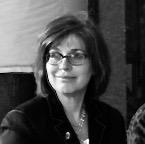
|
Karen Mundy is Professor at the University of Toronto and a globally recognized leader in education and international development. Between 2014 and 2018 she was the Chief Technical Officer at the Global Partnership for Education, where she directed the Strategy, Policy and Performance team and led the development and implementation of GPE's strategic plan (2015-2020), as well as its gender equality strategy, monitoring and evaluation strategy. At GPE she also managed a portfolio of investments in education research and global public goods and built teams in to support GPE’s work on education policy and quality assurance.
Over her career Karen has moved between academic and applied development activities. Karen has published 5 books and more than 50 articles on educational reform in sub-Saharan Africa and the role of international organizations in achieving education for all, twice winning the prestigious Bereday Award for best article in the Comparative Education Review. She has also supported more than a dozen international development organizations to develop and evaluate their education programs. In 2014/15 Karen was President of the Comparative and International Education Society in 2014-2015. At the University of Toronto Karen has held several administrative positions, including Associate Dean of Research, International and Innovation, Department Chair and Director of the Comparative and International Development Education Centre (CIDE). Karen began her career as a teacher and school librarian in rural Zimbabwe. |
Judith Okonkwo
|
Judith will be here March/April 2023. She will teach Virtual Reality for Education in Resource-Constrained Environments. Find our more about her course, here. |
Judith Okonkwo is a Technology Evangelist, Business Psychologist and Organisation Development Consultant with experience working in Africa, Asia and Europe. She sits on the Board of the European Organisation Design Forum, advises Startups, not-for-profits and SMEs on emerging technologies and is a guest lecturer at several HEIs. She is also the creator of the Oriki Coaching Model™ and a co-founder of We Will Lead Africa. Judith is a Fellow of the Royal Society of Arts and an Associate Fellow of the British Psychological Society. In 2016 Judith set up Imisi 3D a creation lab in Lagos focused on building the African ecosystem for extended reality technologies (AR/VR/MR), and connecting XR communities across the continent. The lab provides learning opportunities and access to XR resources for creators and enthusiasts, while supporting engagement and adoption by the wider community, and consulting and content creation for clients. In 2018 she set up AR/VR Africa which holds large XR events on the continent, the most recent - the 2020 AR/VR Africa hackathon - had participants from 27 African countries. In 2021 Imìsí 3D organised the first African Delegation to a global XR event, the African Delegation at Laval Virtual 2021. Judith is especially passionate about the adaptation of immersive technologies to create solutions on the continent, particularly low/mid cost virtual reality, for education, healthcare and storytelling. Imisi 3D’s most recent VR film production Lagos At Large made the Forbes list of the Top 50 XR Experiences of 2019. Judith is a current member of the World Economic Forum’s Global Future Council for Augmented and Virtual Reality.About Imisi 3D Imìsí 3D is an Extended Reality (XR) creation lab focused on building the African XR ecosystem. We are dedicated to growing a community of African AR/VR creators, creating solutions using AR/VR, and providing educational and engagement experiences with AR/VR. We see huge potential for AR/VR as a tool for creating everyday solutions and intend to change the technology narrative so that here we become creators and not just consumers of technology. We are future thinking and committed to being responsible ancestors, creating a better world for today and tomorrow. Social Media
Videos of Imìsí 3D’s work
|
Pauline Rose
|
A811A7: : Reshaping Education on a Global Scale: Exploring the Role of Global Frameworks, International Organizations and Financial Incentives in Shaping Equitable Education in Developing Countries
Enrollment is now closed. Public Lecture: (Why) Does Political Leadership Matter for Girls’ Education?
Student Networking Lunch:
|
Pauline Rose is Professor of International Education at the University of Cambridge and Director of the Research for Equitable Access and Learning (REAL) Centre. Prior to this position, she was Director of the Education for All Global Monitoring Report (from August 2011) during which time she directed two reports on youth, skills and work, and on teaching and learning. Pauline is author of numerous publications on issues that examine educational policy and practice, including in relation to inequality, financing and governance, and the role of international aid. She has worked on large collaborative research programmes with teams in sub‐Saharan Africa and South Asia examining these issues. Throughout her career, she has worked closely with international aid donors and non-governmental organizations, providing evidence-based policy advice on a wide range of issues aimed at fulfilling commitments to education for all.
|
Jaime Saavedra
|
Spring 2022 course: Global Education Challenges and Principles for Policymaking March 21-April 1 - see my.harvard for registration information Student networking lunch: Thursday, March 24th, 12-1pm, Longellow Hall 207- RSVP |
Jaime Saavedra leads the Education Global Practice at the World Bank Group. Between 2013 and 2016 he served as Minister of Education of Peru. During his tenure, he promoted a teachers’ career reform, an expansion of full time secondary, and a bold university reform. The performance of Peru’s education system improved substantially as measured by international learning assessments. Prior to assuming this role, he was Global Director for Poverty Reduction and Equity and Acting Vice-President of Poverty Reduction and Economic Management at the World Bank, where we co-led the establishment of the twin goals of Eliminating Extreme Poverty and pursuing Shared Prosperity, which continue guiding the work of the institution. Throughout his career, Dr. Saavedra, a Peruvian national, has led groundbreaking work in the areas of poverty and inequality, labor markets, the economics of education, and the use of data and evidence in public policy. He has held positions at the Inter-American Development Bank, Economic Commission for Latin America and the Caribbean, International Labor Organization, LACEA and the National Council of Labor in Peru. He has been Executive Director of Grupo de Análisis para el Desarrollo a leading think tank in Peru. He has also held teaching positions and Universidad Católica of Peru, and the University of Toronto. He is currently board member of Teach for All, of the Global Education Evidence Advisory Panel, and the High-Level Council on Leadership & Management for Development of the Aspen Institute. Dr. Saavedra holds a PhD in economics from Columbia University and a Bachelor's degree in economics from the Catholic University of Peru. |
Kiran Bir Sethi
|
Kiran Bir Sethi is the Founder/Director of The Riverside School in Ahmedabad, India. She is also the founder of 'aProCh'—an initiative to make our cities more child friendly, for which she was awarded the Ashoka Fellow in 2008. In 2009, she received the "Call to Conscience Award" by the King Centre at Stanford. n 2009, she founded 'Design for Change' (DFC) - the world's largest movement of change - of and by children. DFC is now in 61 countries—impacting over 2.2 million children and 65,000 Teachers. In September 2011, she won the prestigious "INDEX – Design to Improve Life Award." In June 2012, she was awarded the "Rockefeller Foundation Youth Innovation Award." In February 2014, she received the "Patricia Blunt Koldyke Fellowship 2013" from the Chicago Council on Global Affairs. Design for Change was declared Lego Foundation's "Reimagine Learning Challenge Champion" in November 2014. |
In March 2015, she was amongst the Top 10 Educators, nominated for the Global Teacher Prize - instituted by the Varkey GEMS Foundation. In June 2015, Design for Change won the Commonwealth Education Good Practice Award. Kiran was conferred the Asia Game Changer 2015 Award by Asia Society in October 2015. In February, 2017 she was conferred the “Excellence in Instructional Leadership” Award at NDTV’s National Education Awards. She has been appointed as Ambassador, Vital Voices, in February, 2017 and in May, 2017, she has been nominated as a member of VVLead Fellowship, a partnership between Pond’s and Vital Voices. In June, 2017, she met the Pope in the Vatican to sign an Agreement whereby D.F.C. is being introduced in over 460,000 Catholic Schools across the Globe. In early October, 2017, D.F.C. has been recognised as one of the 100 most innovative educational programmes in the world by HundRED.org (based in Finland). In April, 2018, she has been awarded the “Light of Freedom” Award, at the Vital Voices, U.S.A., Global Leadership Awards. |
Oon-Seng Tan
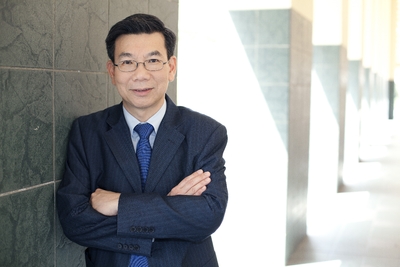
|
Professor Oon-Seng Tan is Director of the Centre for Research in Child Development (CRCD). He was previously director of the National Institute of Education (NIE), Singapore where he played a significant role in enhancing teacher education and revitalising NIE’s training programmes to raise the image and professionalism of teachers. Prior to his directorship, Prof Tan was dean of teacher education at NIE where he spearheaded the Teacher Education for the 21st Century (TE21) initiative. He is also one of the First Board directors of the National Institute of Early Childhood Development (NIEC). He is Editor-in-Chief of the Educational Research for Policy & Practice (ERPP) journal published by Springer and the Lead Editor of the Asia Pacific Journal of Education (APJE) published by Routledge. |
Cecilia Maria Velez White
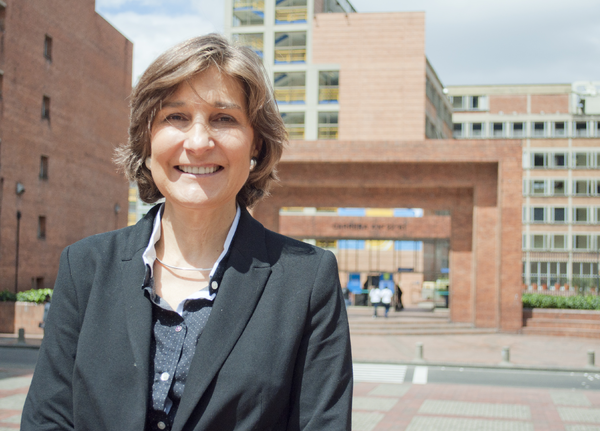
|
Cecilia María Vélez White. Minister of Education of Colombia (2002-2010), Secretary of Education of Bogotá (1998-2002) . At the National Planning Department of Colombia, she served as Director of the Unit for Regional and Urban Development (1990-1993) and as Deputy Director (1994).Visiting Professor at Harvard University Graduate School (2010-2011); International consultant in Institutional Development. Current Rector at Universidad Jorge Tadeo Lozano (since 2012) |
Xu Zhao
|
Professor Zhao's virtual visit- November 2021.
|
Xu Zhao is Associate Professor at the Werklund School of Education, University of Calgary. The goal of her research is three-fold: to understand the risk factors (psychological and sociocultural) that threaten the positive development of school-aged youth, to identify the protective factors that foster resiliency, and to develop intervention strategies for the protection and promotion of youth wellbeing. She conducts empirical research in China and Canada. She also engages in scholarly discussions on the impact of macro-level national and global trends in educational policies on micro-level youth performance. She is the author of Competition and Compassion in Chinese Secondary Education (Palgrave MacMillan, 2015). Her research has been published in leading academic journals and featured by international media including the Washington Post, Education Week, and Voice of America. She earned her doctorate in Human Development & Psychology from Harvard Graduate School of Education in 2011. Course title: Narratives of Educational Success and Their Hidden Costs: The Case of Chinese Education from Critical and Interdisciplinary Perspectives
Her virtual class will be
Registration for this class will open approximately 1 month prior to the first class meeting. |

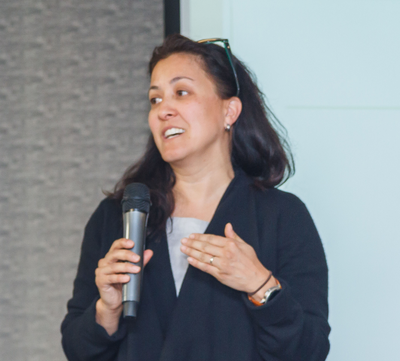
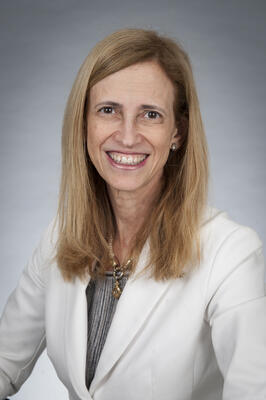
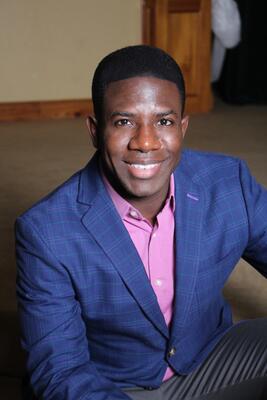

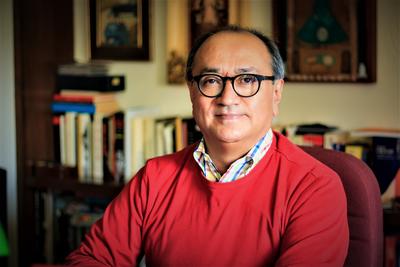

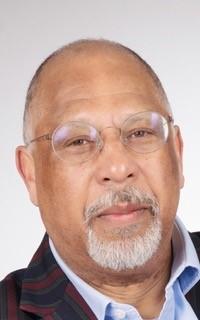
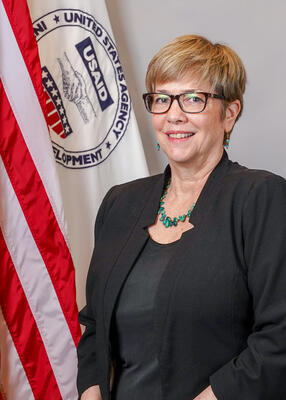
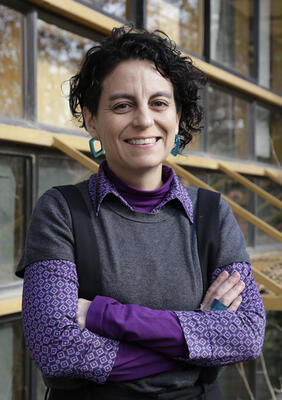 Alejandra will be here in April 2023. She will teach, Language and Literacy for Learning in Latin America. More information coming soon!
Alejandra will be here in April 2023. She will teach, Language and Literacy for Learning in Latin America. More information coming soon!
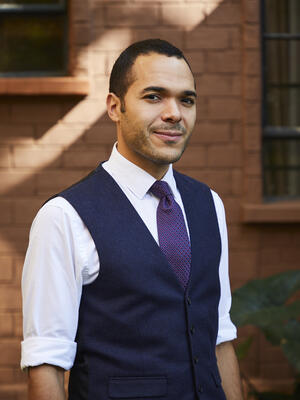
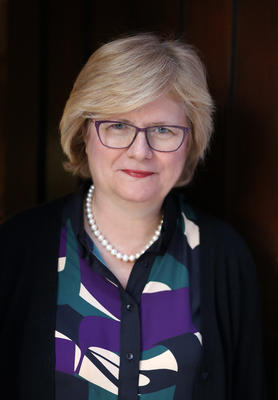
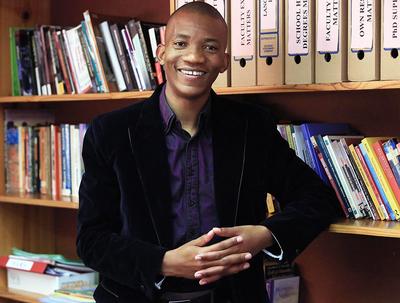 Course: Gender and Sexual Identification in Africa: Spotlighting the South African Education System
Course: Gender and Sexual Identification in Africa: Spotlighting the South African Education System

